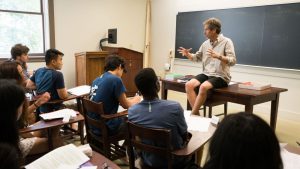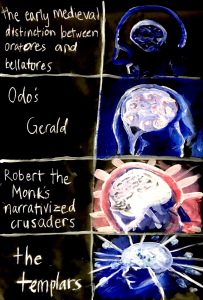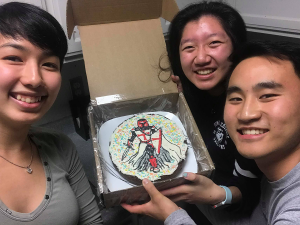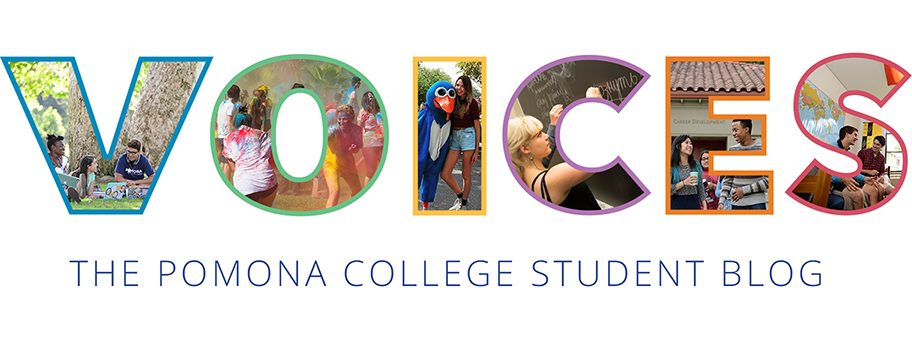By Jacinta Chen ’21
Some of the best memories I have at Pomona come from ID1.
What is ID1?
Pomona’s Critical Inquiry Seminar, better known on campus as ID1, is a required writing and discussion-based seminar all first-years take during their first semester at the College. The approximately 30 sections are taught by faculty from across the disciplines and engage students in rigorous, college-level reading, writing, and discussion on varied topics chosen by professors. Throughout the course, students work together with their classmates, professor, and ID1 intern from the Writing Center to write and revise multiple drafts of essays. By the end of the first semester, first-year students know what tools to use in order to write a long research paper, and likely have even written one or more of this type of paper for that class.
 After being admitted to Pomona, the incoming class is asked to explore the ID1 class options. Ultimately, first-year students rank 10 or 11 choices, in order of preference, out of the 30 or so that are available. Since ID1 classes are taught by professors from across the disciplines (math to history, art, music, and more), the topics range significantly and allow students to find multiple classes that pique their interests. After selecting my choices, I ended up taking “The First Crusade: Monks of War,” where I explored the gradual conflation of monks’ and warriors’ identities in Medieval Europe with Professor Wolf plus ten other first-year students.
After being admitted to Pomona, the incoming class is asked to explore the ID1 class options. Ultimately, first-year students rank 10 or 11 choices, in order of preference, out of the 30 or so that are available. Since ID1 classes are taught by professors from across the disciplines (math to history, art, music, and more), the topics range significantly and allow students to find multiple classes that pique their interests. After selecting my choices, I ended up taking “The First Crusade: Monks of War,” where I explored the gradual conflation of monks’ and warriors’ identities in Medieval Europe with Professor Wolf plus ten other first-year students.
What was the class like?
For the most part, our class involved readings and subsequently, worksheets or papers that were related to the primary and secondary sources that we read. We began the semester by learning the standard for college-level expository essays based on primary sources, and then we transitioned to writing literature reviews on secondary sources. We ended with papers that comprised elements of both types of writing, culminating in a fully-fleshed-out formal research proposal that could be used for a thesis-sized paper.
During each class session, we either discussed the data we had mined from the reading, critiqued each other’s papers in group peer review sessions, or learned how to write like a historian. We were taught how to formulate a clear, yet concise introduction with a thesis and roadmap and also how to write extremely clear first sentences for our data paragraphs. We learned to weave evidence into our papers in an effective manner, add meaningful footnotes, end with a conclusion that would pose a new question for future research, and create an extremely elaborate Chicago-style citations page from scratch. Unique to Professor Wolf’s courses, we ended the writing seminar with a mandatory, but ungraded art show to celebrate the semester of learning.
How did we learn, grow, and have fun through ID1?
While writing this post, I decided to ask a couple of my classmates (shout-out to Emily P, Jacob N, and Nate P) for some of their thoughts on the value of ID1.
 ID1 encouraged us to try something new and to keep an open mind throughout the process. Though I’ve always loved history, many of my classmates didn’t have very pleasant experiences with history in high school or just weren’t that interested in history as a subject at the beginning. However, our history-based class on monk-warriors was something really niche and far from anything any of us had previously studied or even heard about.
ID1 encouraged us to try something new and to keep an open mind throughout the process. Though I’ve always loved history, many of my classmates didn’t have very pleasant experiences with history in high school or just weren’t that interested in history as a subject at the beginning. However, our history-based class on monk-warriors was something really niche and far from anything any of us had previously studied or even heard about.
Following along the lines of the goal of ID1 for Pomona students, the class pushed us to develop and scrutinize the writing capabilities we had from high school. My classmates and I were stretched in many ways with countless hours spent reading, writing, and speaking. However, as the semester came to an end, we were proud of the immense progress that we had made together and the fact that we all could write significantly better.
My ID1 classmates and I are all majoring in different areas, including but not limited to: computer science, international relations, cognitive science, history, politics, environmental analysis, art history, chemistry, and classics. Even so, we’ve found how much the writing and analytical skills we gained from the class have helped us excel in writing papers for our other courses at Pomona. Our professor was very specific about the expectations and style that he expected our essays to have, but the feedback he gave has made a big difference in how we write today. In a nutshell, the class succeeded in bridging the gap between high school- and college-level writing.
 Beyond the unparalleled learning experience from ID1, we had a lot of fun together. As first-year students, we bonded over the academic challenges our professor gave us, shared office hours sessions multiple times a week, peer editing in and outside of class, and even an impromptu dinner at the dining hall one evening when we were all stressing out over the formal research proposals we needed to write. In addition to the friendships we came away from ID1 with, we also cultivated a really strong relationship with Professor Wolf, who has been a wonderful mentor and advisor to us since ID1. A couple times a semester, some of us reconnect and catch up with Professor Wolf for meals in the dining hall. Last semester, we bonded over baking a medieval cake and commemorated the class with a dinner at our professor’s house as sophomores!
Beyond the unparalleled learning experience from ID1, we had a lot of fun together. As first-year students, we bonded over the academic challenges our professor gave us, shared office hours sessions multiple times a week, peer editing in and outside of class, and even an impromptu dinner at the dining hall one evening when we were all stressing out over the formal research proposals we needed to write. In addition to the friendships we came away from ID1 with, we also cultivated a really strong relationship with Professor Wolf, who has been a wonderful mentor and advisor to us since ID1. A couple times a semester, some of us reconnect and catch up with Professor Wolf for meals in the dining hall. Last semester, we bonded over baking a medieval cake and commemorated the class with a dinner at our professor’s house as sophomores!
ID1 was valuable in helping me adjust to college-level writing and college life as a whole. Ultimately, I am really appreciative of the role that my critical inquiry seminar has played in making my Pomona experience so special.
